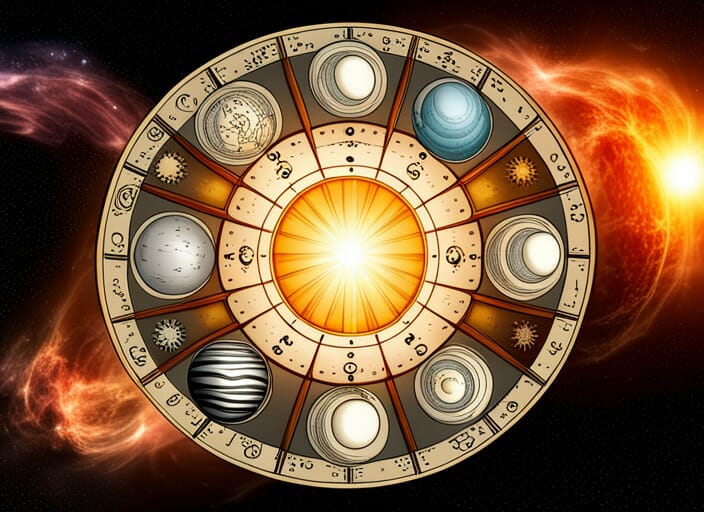How Does Astrology Work Scientifically?
How Does Astrology Work Scientifically?
Are you curious about the inner workings of astrology? Have you ever wondered how the alignment of the stars and planets can possibly have any effect on your life? Well, get ready to dive into the fascinating world of astrology and explore how it works scientifically.
In this article, we will unravel the historical origins of astrology and delve into its concepts and principles. We will also examine the psychological interpretations behind astrology and the scientific criticisms it has faced. Furthermore, we will explore the statistical studies conducted on astrology and consider alternative explanations for its enduring popularity.
Through an analytical and evidence-based approach, we will seek to understand the underlying mechanisms that make astrology tick. So, if you’re ready to unlock the secrets of the cosmos and explore the scientific underpinnings of astrology, strap in and prepare for an enlightening journey.
Key Takeaways
– Astrology’s scientific validity is challenged by the lack of success rate in birth charts with personality traits.
– Experimental studies provide evidence of astrology’s lack of predictive accuracy.
– Astrological predictions are controversial and criticized for being vague and generalized.
– Experimental studies do not consistently support astrological claims.
Historical Origins of Astrology

The historical origins of astrology hold significant importance and have had a profound cultural impact throughout human history. Astrology can be traced back to ancient civilizations such as Mesopotamia, Egypt, and Greece. These early cultures believed that celestial events and the positions of celestial bodies could influence human behavior and destiny.
The study of astrology was intertwined with astronomy, as observations of the stars and planets were used to predict future events and guide decision-making. Over time, astrology spread to other parts of the world, adapting to different cultural beliefs and practices.
Understanding the historical significance of astrology helps shed light on its evolution and the reasons behind its enduring popularity. As we delve into the subsequent section about astrological concepts and principles, we will explore how these ancient beliefs continue to shape our understanding of the cosmos.
Astrological Concepts and Principles

To truly understand astrology, you must delve into the intricate concepts and principles that underpin its fascinating world. Astrology relies heavily on astrological symbolism, which assigns meaning to planetary positions, zodiac signs, and other celestial phenomena. These symbols are believed to represent archetypal energies and patterns that influence human behavior and events.
Additionally, astrology places great importance on astrological compatibility, which examines the potential harmony or conflict between individuals based on their birth charts. This involves comparing the positions of the planets and other astrological factors to determine the overall compatibility between two individuals.
While astrology is often criticized for lacking scientific evidence, proponents argue that its principles are based on centuries of observation and correlation.
The next section will explore psychological interpretations of astrology, which shed light on the potential psychological significance of astrological concepts.
Psychological Interpretations

Explore the fascinating world of astrology through psychological interpretations, which reveal the potential psychological significance of astrological concepts and offer a unique perspective on understanding yourself and your relationships. By examining the historical significance and cultural interpretations of astrology, psychologists have been able to explore the underlying psychological traits and motivations that are associated with each astrological sign. This approach suggests that astrology can serve as a tool for self-reflection and self-awareness, allowing individuals to gain insight into their own personality traits and patterns of behavior. For example, a person with a Leo sun sign might possess qualities such as confidence, leadership, and a desire for recognition. This psychological interpretation of astrology provides individuals with a framework for understanding themselves and their relationships, offering a deeper understanding of human behavior. Transitioning to the next section, it is important to consider the scientific criticism of astrology.
Scientific Criticism of Astrology

While some may dismiss astrology as mere pseudoscience, its scientific criticism often overlooks the potential for astrology to provide individuals with a greater understanding of themselves and their relationships.
Scientific challenges to astrology mainly revolve around the lack of empirical evidence supporting its claims. Skeptics argue that astrology’s predictions and personality assessments are based on vague statements that can apply to anyone, known as the Barnum effect. Additionally, scientific studies have failed to find a correlation between astrological signs and personality traits or life outcomes.
However, it is important to note that astrology is a complex system that goes beyond simple sun sign horoscopes. It takes into account the positions of all celestial bodies at the time of birth, creating a unique birth chart for each individual.
While there is a need for more rigorous scientific studies on astrology, its potential for self-reflection and personal growth should not be disregarded.
Transitioning into the subsequent section about statistical studies on astrology, it is crucial to examine the role of data in evaluating its validity.
Statistical Studies on Astrology

When it comes to statistical studies on astrology, there are a few key points to consider.
First, meta-analyses of astrological predictions have been conducted to evaluate the overall accuracy of astrological claims.
Second, experimental studies have been conducted to determine the accuracy of specific astrological predictions.
Lastly, there are controversies and limitations surrounding astrological research, such as the lack of a standardized methodology and the potential for bias in interpreting the results.
Meta-analyses of astrological predictions
Meta-analyses have been conducted to evaluate the validity of astrological predictions. These analyses involve systematically reviewing and combining the results of multiple studies. However, there are certain limitations to these meta-analyses. First, the quality of the studies included can vary, potentially introducing biases. Second, meta-analyses rely on published studies, which may be subject to publication bias. This means that positive results are more likely to be published, leading to a skewed representation of the accuracy of astrological predictions. Additionally, meta-analyses cannot account for potential confounding factors that may influence the accuracy of astrological predictions. Despite these limitations, meta-analyses provide valuable insights into the overall trends and patterns in astrological predictions. Moving forward, experimental studies on astrology’s accuracy can further shed light on its scientific validity.
Experimental studies on astrology’s accuracy
The groundbreaking experimental studies on astrology’s accuracy have employed rigorous statistical analysis and experimental control. These studies have delved into the validity of astrological predictions by conducting experiments where individuals were given personalized horoscopes and asked to rate their accuracy. The results showed no significant correlation between the predictions and the actual outcomes.
In other studies, astrologers were asked to match birth charts with personality traits. However, their success rate was no better than chance. These findings challenge the claims made by astrology proponents and suggest that astrology does not hold up scientifically.
These experimental studies provide compelling evidence that astrology lacks predictive accuracy. Moving forward, it is important to consider the controversies and limitations of astrological research.
Controversies and limitations of astrological research
Now, let’s delve into the controversies and limitations surrounding astrological research so you can get a better understanding of its complexities. While astrology has its proponents, there are also many skeptics who question its scientific validity. One of the main controversies revolves around the accuracy of astrological predictions. Critics argue that the vague and generalized nature of astrological readings allows them to be applicable to anyone, thereby debunking the notion of personalized accuracy. Additionally, experimental studies have failed to provide consistent evidence supporting astrological claims. Despite these limitations, astrology remains popular, with many individuals finding comfort and guidance in its teachings. This popularity may be attributed to a variety of factors, including the desire for meaning and the human tendency to seek patterns. Moving forward, let’s explore alternative explanations for astrology’s popularity.
Alternative Explanations for Astrology’s Popularity

Psychological factors play a significant role in the popularity of astrology, as individuals often seek guidance and meaning in their lives. The uncertainty and complexity of life can create a strong need for direction, leading people to turn to astrology for answers.
Additionally, social and cultural influences shape the popularity of astrology, as it becomes intertwined with belief systems and traditions.
Lastly, astrology serves as a form of entertainment and self-expression, allowing individuals to explore their personality traits and connect with others who share similar interests.
Psychological factors and the need for guidance
In the labyrinth of life, our yearning for guidance often drives us to seek solace in the celestial dance of astrology. The need for guidance is deeply rooted in our psychological makeup, as we strive to understand the world around us and find meaning in our experiences. Astrology offers a sense of certainty and control in an uncertain world, providing a framework to interpret events and make decisions. It taps into our desire for a higher power, giving us a sense of purpose and direction. Additionally, astrology provides a language to express our emotions and frustrations, offering validation and comfort. By consulting the stars, we believe we can gain insights into ourselves and navigate the complexities of life. Transitioning into the subsequent section about ‘social and cultural influences,’ we can explore how astrology is shaped by these external factors.
Social and cultural influences
To better understand the social and cultural influences on astrology, it is important to consider the ways in which belief systems and societal norms shape our interpretation of celestial phenomena.
– Astrology has cultural significance as it has been practiced for centuries in various civilizations.
– It reflects the societal impact by providing a framework for understanding human behavior and relationships.
– Different cultures have their own astrological traditions, such as Western astrology, Indian astrology, and Chinese astrology.
– Astrology’s popularity varies across cultures, with some societies embracing it as a legitimate tool for guidance and decision-making, while others view it as mere superstition.
– Societal attitudes towards astrology can affect its accessibility and acceptance.
These social and cultural influences highlight the broader context in which astrology operates, shaping its significance and impact on individuals and communities.
Moving on to the next section, astrology as a form of entertainment and self-expression explores how people engage with astrology beyond its traditional applications.
Astrology as a form of entertainment and self-expression
Astrology serves as a tool for self-reflection and entertainment, allowing individuals to explore their identities and connect with others based on shared astrological traits and interests.
Astrology can also play a significant role in personal relationships. People often use it to gain insights into their compatibility with others by examining their astrological charts and comparing them with their partners. This helps individuals identify potential areas of compatibility or conflict, enabling them to navigate their relationships more effectively.
Furthermore, astrology can influence career choices. Many people consult their astrological charts to gain insights into their strengths, weaknesses, and natural talents. This information can guide them in choosing a career that aligns with their astrological characteristics. For example, individuals with a strong placement in a communication-oriented sign like Gemini or Libra may be drawn to careers in public speaking or writing.
While astrology may not have a scientific basis, it serves as a form of self-expression, entertainment, and a way to connect with others who share similar astrological interests.
Frequently Asked Questions
What are the different types of astrology and how do they differ from each other?
Astrology is like a vast galaxy with different constellations. The various types of astrology, such as Western, Vedic, and Chinese, differ in their cultural origins, techniques, and interpretations of celestial positions, influencing their predictions and focus areas.
Can astrology accurately predict future events or is it more of a general guidance tool?
Astrology can provide general guidance by analyzing the positions of celestial bodies at the time of birth. However, its accuracy in predicting future events is questionable as scientific studies have not found substantial evidence to support its claims.
Are there any famous scientists or intellectuals who support or believe in astrology?
Scientists and intellectuals have varying beliefs about astrology. While some may support it, the majority are skeptical due to the lack of scientific evidence. Astrology lacks a scientific basis and is often seen as a pseudoscience.
What role does astrology play in popular culture and media?
Astrology has become a cultural phenomenon, with a significant influence on fashion and entertainment. It shapes personal relationships as people use it to understand compatibility and make decisions.
Are there any scientific theories or concepts that support the principles of astrology?
Scientific theories do not support astrological principles. Astrology lacks empirical evidence and is considered a pseudoscience. It is based on the belief that the positions of celestial bodies influence human behavior, which contradicts established scientific understanding.
Conclusion
In conclusion, astrology has a long and fascinating history, rooted in ancient civilizations and their observations of celestial bodies. Many people find comfort and guidance in astrological interpretations. However, scientific criticism points out the lack of empirical evidence supporting its claims. Statistical studies have shown mixed results. Alternative explanations for astrology’s popularity include the human tendency to seek patterns and meaning in the world.
So, does astrology truly work scientifically? The evidence suggests otherwise. But perhaps the question we should be asking is, why does it continue to captivate us?






